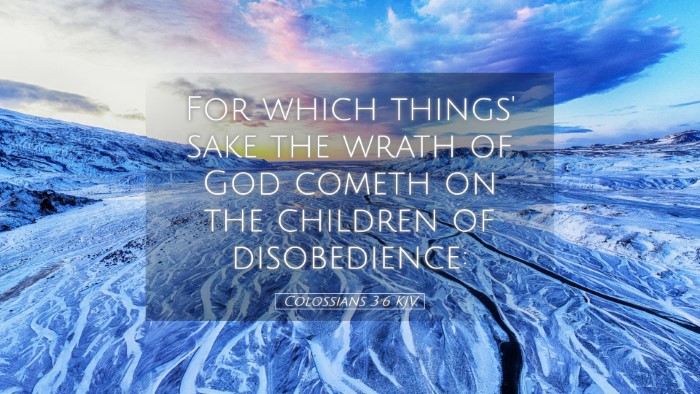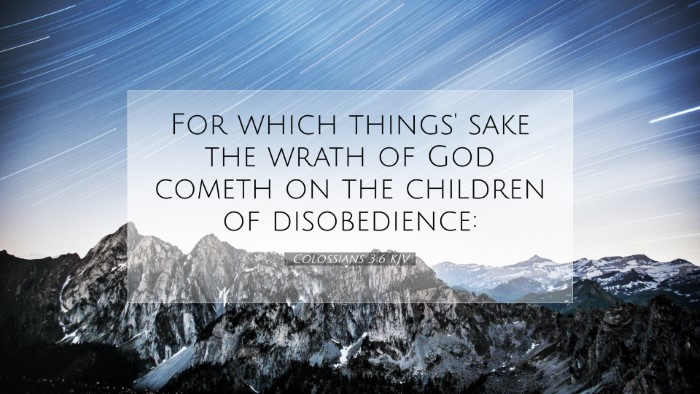Commentary on Colossians 3:6
Verse Reference: Colossians 3:6 - "For which things' sake the wrath of God cometh on the children of disobedience."
Introduction
This verse serves as a sobering reminder of the consequences of sin and disobedience. In the broader context of Colossians, the Apostle Paul addresses the importance of ethical living in light of the believer's new identity in Christ. This commentary draws on insights from esteemed public domain commentators such as Matthew Henry, Albert Barnes, and Adam Clarke.
Contextual Overview
The Apostle Paul, in his epistle to the Colossians, emphasizes the transformative power of faith in Christ. Earlier in the chapter, he encourages believers to set their minds on things above, urging them to put to death the sinful practices that once defined their lives. This call to moral living reflects the necessity of aligning one’s behavior with their spiritual identity.
Insights from Matthew Henry
Matthew Henry reflects on the gravity of sin and its repercussions. He notes that the "wrath of God" is not merely a passive reaction but an active engagement against sin:
- Active Judgment: Henry emphasizes that God’s wrath is justly directed towards the "children of disobedience," highlighting that disobedience is a serious offense against Divine law.
- Nature of God's Wrath: His commentary posits that God's anger is not arbitrary but stems from His holiness, truth, and righteousness. Thus, those who continue in sin are set on a course that invites divine judgment.
- Moral Responsibility: He encourages believers to recognize their moral responsibility in light of God's grace, urging them to reject sinful behaviors that provoke wrath.
Insights from Albert Barnes
Albert Barnes provides a theological lens to understand this verse's implications for Christian living:
- Children of Disobedience: Barnes defines this phrase as those who habitually live in rebellion against God. He highlights that this disobedience results in a forfeiture of God's blessings.
- Divine Wrath as a Warning: Barnes interprets God's wrath as both a present and future reality. He stresses that while God's grace is abundant, ignoring His warnings and continuing in sin ensures dire consequences.
- Transformation through Christ: Barnes underlines the hope found in Christ, suggesting that believers should live in stark contrast to the "children of disobedience," embodying the righteousness that comes through faith.
Insights from Adam Clarke
Adam Clarke’s commentary offers a pastoral perspective on the implications of Paul’s exhortation:
- Distinctiveness of Christian Life: Clarke posits that believers are called to lead lives that are distinct from those bound by sin. The phrase "wrath of God" is utilized as a strong motivator for ethical conduct.
- Nature of God's Judgment: Clarke elaborates on the idea that God's wrath will manifest in various forms, not only eschatological but also through the natural consequences of sin in the present life.
- Call to Accountability: He challenges the congregation to be accountable for their actions and encourages repentance as a pathway to avoid the wrath that is due to disobedience.
Theological Reflections
In synthesize the insights of these commentators, several important theological implications arise:
- Sin's Consequence: The wrath of God is a serious and unavoidable consequence of sin, reflecting the necessity for believers to align their lives with God’s will.
- Identity in Christ: Understanding the "children of disobedience" provides a stark contrast to the believer’s identity, emphasizing that a new life in Christ entails a rejection of former sinful practices.
- Urgency of Repentance: Each commentator agrees on the urgency of repentance and the importance of a transformed life that is responsive to the leading of the Holy Spirit.
- Hope in Grace: Ultimately, the emphasis on God’s grace provides hope, suggesting that while the wrath of God is real, the salvation available through Jesus Christ offers deliverance from such judgment.
Practical Applications for Believers
As we consider the implications of Colossians 3:6 for modern believers, the following applications emerge:
- Self-Examination: Regularly evaluate personal conduct in light of scripture, ensuring alignment with God’s standards and a life that glorifies God.
- Cultivating a Holy Lifestyle: Actively pursue righteousness by engaging in practices that nourish spiritual growth, such as prayer, study of the Word, and fellowship with other believers.
- Awareness of Consequences: Recognize that sin carries consequences, both spiritually and temporally, motivating a lifestyle of holiness.
- Proclaiming Grace: Share the message of hope and grace found in Christ, reaching out to those entangled in disobedience with the good news of redemption.
Conclusion
Colossians 3:6 serves as a vital reminder of the seriousness of sin and the just nature of God's wrath. The insights from Matthew Henry, Albert Barnes, and Adam Clarke highlight the delicate balance between warning and grace that is foundational to the Christian faith. By understanding our identity in Christ and the implications of our behavior, we are called to lead lives marked by integrity, holiness, and dependence on God's transformative power.


